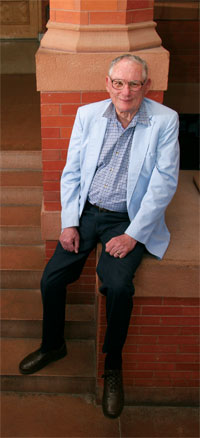
| Bill Hochman | |
| By Peter Rice ’05 |
Emeriti Professors Jane Cauvel and Bill Hochman: Change Struggles; Constancy Evolves
The one constant in life is change, especially at Colorado College, where classes last 3 1/2 weeks and a quarter of the student population is replaced every year. But emeriti professors Bill Hochman (history) and Jane Cauvel (philosophy) say that a willingness to change is one of the best aspects of the college, because it creates a healthy evolution — a struggle, really — toward an even stronger emphasis on the liberal arts. They have had a chance to witness how change has contributed to constancy over the decades: Hochman arrived on campus in 1955, Cauvel in 1960.
 Q: Bill, you got here in 1955. That’s a long time ago!
Q: Bill, you got here in 1955. That’s a long time ago!
Hochman: It doesn’t seem a long time to me. Yesterday I was a “young Turk” at the college — now I am the very “old guard.” My advice to students and faculty is this: seize and savor every day; it goes fast!
Q: How did the Block Plan change the college?
Hochman: To many people, the Block Plan proposal seemed like a gimmick without a great deal of substance. In courses dealing with ideas, which CC courses do, reading, thought and discussion are a deliberate process requiring time for germination and flowering. Many of the promised aspects of the Block Plan did not materialize — for example, the flourishing of extra-curricular activities or the periodic coming together of the college community to counter the separatism of block courses. Devoted students do take advantage of afternoons and evenings to go into subjects in depth. Others seem to do their assignments in the afternoons, leaving almost every evening free for partying.
Of course, the Block Plan did offer striking advantages. Small classes are wonderful. The block system permitted students and faculty to focus on a single subject for a short spurt of time; no more time-stealing between courses. It opened the way to going off campus for solid periods.
The Block Plan has always been hard work for the faculty. If full advantage is taken of the structure, each day’s class meets more clock minutes than classes did in a week under the semester plan. Meeting a small group of bright students for three hours every day is a challenge, to say the least, and also a great joy. Reducing the number of courses taught during the year does not relieve the intense, unremitting pressure of block teaching. I have sometimes thought of teaching under the Block Plan as playing a series of sudden-death overtime periods in a row.
The Block Plan obviously has strengths and weaknesses. The Plan is partly a gimmick, but it is our gimmick. It is the trumpet we bump it with, borrowing from the song in “Gypsy.” After all these years, I do not know if the Block Plan is actually better than a traditional semester plan (it has not been widely emulated elsewhere), but it is worth keeping alive as our unique contribution to the rich, diverse spectrum of higher education. Its pressing demands signify Colorado College’s devotion to teaching as the central enterprise of liberal education.
Q: Any favorite moments stick out in your mind?
Hochman: I think I have a favorite moment every day of teaching, when I step into the classroom with those bright-faced, beautiful students waiting. That is a moment that never gets old.
Here's one of 35 facts about CC:
30
CC students are entitled to a free summer session course before they graduate.
The Colorado College | 14 East Cache La Poudre Street | Colo Sprgs, CO | 80903 | 719-389-6000